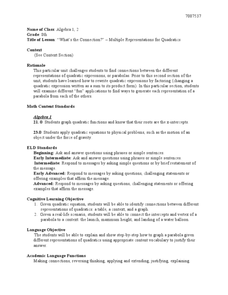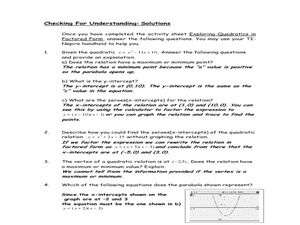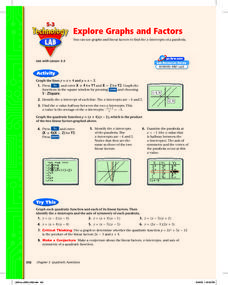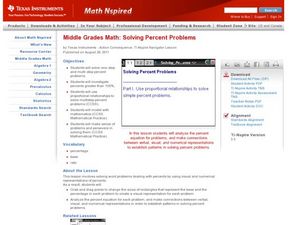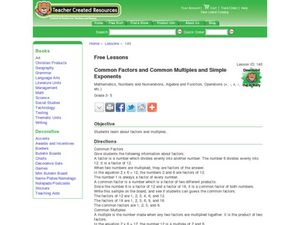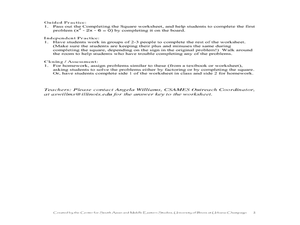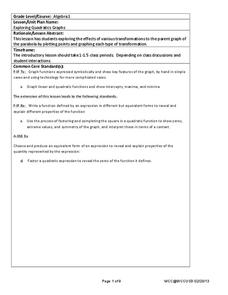Curated OER
Square Roots, Number Classification, Ordering & Graphing
Ninth graders identify numbers as rational or irrational. Using calculators estimation, and factoring methods, 9th graders compute the square root of numbers. They graph numbers in sequential order and round numbers integers to the...
Curated OER
Representing Quadratics
Young scholars represent quadratic equations using different methods. In this algebra instructional activity, students solve quadratics using substitution, elimination and graphing. They relate quadratics to the real world.
Texas Instruments
Exploring Quadratics in Factored Form
Young mathematicians explore quadratics equations in this lesson. They investigate the relationship between the standard form and factored form of quadratic equations. Learners then examine the relationship between the factoring form of...
Curated OER
Quadratics Equations
In this algebra worksheet, learners define the equations and discuss how many and what kinds of roots there will be. There are 6 questions dealing with roots, complex numbers and quadratics.
Curated OER
Explore Graphs and Factors
Pupils graph the factors of a quadratic as linear equations and graph the parabolic equation in factored form. Also, they investigate the relationship between the x-intercepts of the lines and the zeros of the parabola.
Curated OER
Grade 5: Multiple Towers
Fifth graders use interlocking cubes to build towers to represent factors of numbers and place the towers in the appropriate places on a Tower chart in order to look for patterns. They work in partner groups, and finish by writing...
Curated OER
Solving Percents Problems
Students solve problems dealing with percents. For this algebra lesson, students convert between decimals and percents using factoring. They solve one step problems involving percents.
Curated OER
Multiplying Polynomials - FOIL
Pupils participate in an activity to demonstrate the distributive property. They take notes as they observe different methods of FOIL. Afterward, students work on their own, and in groups to determine which method to use and complete...
Curated OER
Common Factors and Common Multiples and Simple Exponents
Students explore factors and multiples. In this factors and multiples lesson, students learn the vocabulary words factor, common factor, multiple and common multiple. Students view examples of each and then complete activity sheets.
Curated OER
Quadratic Equations
Tenth graders review algebraic methods of solving quadratic equations. Students discuss several methods of solving quadratic equations. They practice factoring and finding the roots of an equation for solving. A calculator is used to...
Curated OER
Completing the Square Lesson Plan
Students investigate the origin of the quadratic function. In this algebra lesson, students analyze solving an equation by completing the square. They compare the early methods as compared to our method for solving quadratics.
EngageNY
Structure in Graphs of Polynomial Functions
Don't allow those polynomial functions to misbehave! Understand the end behavior of a polynomial function based on the degree and leading coefficient. Learners examine the patterns of even and odd degree polynomials and apply them to...
EngageNY
Completing the Square (part 1)
Avoid the trap of memorizing steps when completing the square with a resources that provides a conceptual approach to completing the square. Learners that are able to recognize a perfect square trinomial are ready to complete the...
EngageNY
Deriving the Quadratic Formula
Where did that formula come from? Lead pupils on a journey through completing the square to discover the creation of the quadratic formula. Individuals use the quadratic formula to solve quadratic equations and compare the method to...
West Contra Costa Unified School District
Exploring Quadratics and Graphs
Young mathematicians first graph a series of quadratic equations, and then investigate how various parts of the equation change the graph of the function in a predictable way.
West Contra Costa Unified School District
Divisibility Rules Justified
How do you know if a number is divisible? Instructors first prove the divisibility rules for three and four and then class members use this modeling to prove given divisibility rules for eight and nine either individually or in...
Curated OER
Factors, Divisibility, and Relatively Prime
Seventh graders explore the concept of divisibility. In this divisibility lesson, 7th graders use divisibility rules to find factors of numbers. Students create foldables to illustrate divisibility rules.
Curated OER
The football and Braking Distance; Model Data with Quadratic Functions
Students use the quadratic formula to solve application problems. The first problem relates to the path of a football thrown from the top of the bleachers. Students compute the time it will take the football to reach certain heights. In...
Curated OER
Applications Of Rational Functions
Students engage in a lesson that is about relational functions with the application of methods to real life problem situations. They use the examples found in the lesson for the purpose of practice during guided instruction. Students can...
Curated OER
Sums and Difference of Cubes
Learners factor polynomials using the sum and difference of cubes. They also learn connections between the graph and expression.
Curated OER
Calculate the Slope of a Line Using Two Points
Find that slope! This video does an excellent job of demonstrating how to use the slope formula to find the slope of a line using two points. The instructor first reviews the definition of slope of a line, then works three problems using...
Center for Mathematics and Technology
Whole Numbers: Using an Area Model to Explain Multiplication
There are many ways to work through a multiplication problem. Using an area model, kids complete several worksheets with different types of multiplication problems, including multiplying by ten, and explain how the new strategies differ...
Ohio Department of Education
The Solution is Complex
Consider complex numbers, roots, and quadratic equations. Use the discriminate as a way to determine the nature of a quadratic's roots. Then discuss the similarities and differences between quadratics with two, one, or no real roots....
Virginia Department of Education
Rational Functions: Intercepts, Asymptotes, and Discontinuity
Discover different patterns by making connections between a rational function and its graph. An engaging instructional activity asks scholars to explore the behavior of different rational functions. Groups discover a connection...
Other popular searches
- Algebra Tiles Factoring
- Algebra Projects Factoring
- Factoring With Algebra Tiles
- Algebra Factoring Trinomials
- Algebra Factoring Binomials
- Algebra Factoring
- Factoring Algebra Puzzle
- Algebra Project Factoring
- Factoring Algebra Answer Key
- Algebraic Factorization Tree
- Algebra Factoring Trinomials
- Algebra Factoring Triennials

